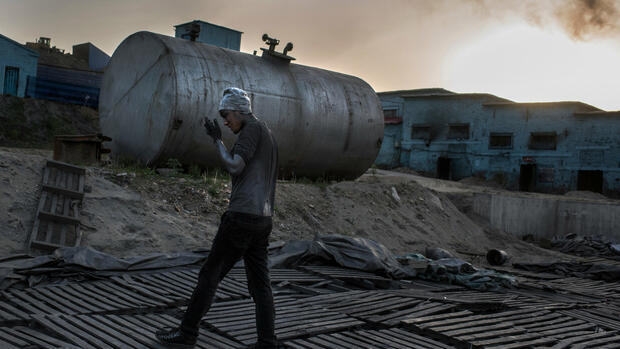According to the International Energy Agency, the country also processes 70 percent of its graphite for anodes, the positively charged electrode of a battery.
(Photo: The Washington Post/Getty Images)
Tokyo The Japanese government wants to heavily subsidize the mining and processing of lithium and other minerals important to the electric car industry. According to an unconfirmed report by business daily Nikkei, the Ministry of Economy, Trade and Industry (Meti) plans to support companies with up to half the cost of mine development and smelting projects.
The Japanese government wants to reduce the dependence of its own industry on China, which has so far been the world’s most important supplier of processed lithium and rare earths. But other raw materials such as manganese, cobalt and graphite, which are important for lithium-ion batteries and magnets for electric motors, also dominate China.
Experts estimate that up to 80 percent of the lithium for batteries currently comes from China, along with 70 percent of the rare earths and 38 percent of the cobalt. According to the International Energy Agency, the country also processes 70 percent of its graphite for anodes, the positively charged electrode of a battery. In addition, China has been investing in mines worldwide for years in order to establish itself as the world’s leading electric car power.
But it is not only the high level of dependence on a supplier that Japan increasingly perceives as a military threat that is driving Tokyo to act. Another factor is the US subsidy policy for electric cars.
The “Inflation Reduction Act” beckons automakers with tax credits of up to $7,500 when buying new electric cars – under conditions: First, the cars must be manufactured in North America. Secondly, in the near future not only the batteries but also the raw materials for their production will have to come from the USA or from countries with which the USA has a free trade agreement.
Japan pushes ahead with US commodity deal
These conditions have provoked resentment not only in Europe but also among US Asian allies South Korea and Japan. The Japanese manufacturers could still take the hurdle of local production.
The global race for lithium mines is in full swing.
(Photo: REUTERS)
Because since the US trade war against its close Asian ally in the 1980s, they have set up factories in North America in order to be able to serve the US market as locally as possible. They now want to repeat this.
The big problem so far has been the battery factories. South Korean and Japanese battery manufacturers are planning local battery factories. However, the raw materials often still come from China.
To change that, the US and its allies, including Germany, agreed to a critical minerals partnership last year. Japanese companies in particular are active in cooperation with their government both in the development of mines and in processing.
>> Read here: Hope for US billions in funding for German car manufacturers
Japan has even got what the EU is still hoping for: At the end of March, after less than three months of negotiations, Tokyo and Washington agreed on an agreement on critical minerals that also takes raw materials processed in Japan into account for subsidies.
Negotiations with the EU have already started. But US Trade Representative Katherine Tai refrained from making forecasts in Japan last week. “The EU is a very different trading partner from Japan,” she told the Foreign Correspondents’ Club of Japan (FCCJ). The EU is a collection of 27 countries, “which is quite complex,” Tai said. “So I’d leave it at that and say we’ll see how long it takes.”
>> Read here: These 20 tech trends will shape 2022
Following the success of the negotiations in Japan, the next step is now subsidies. According to “Nikkei”, the Japanese Organization for Metals and Energy Security (Jogmec) already has a fund of 105.8 billion yen (720 million euros) ready for this. This is intended to promote geological investigations into the quality of the mines as well as development and further processing.
More: Up to 90 gigawatt hours – Canada will be VW’s largest battery location
